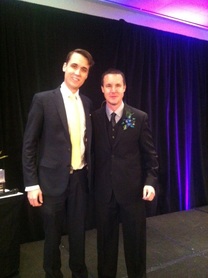
Freedomway.ca
facebook.com/stefanaarnio
https://twitter.com/stefanaarnio
http://ca.linkedin.com/in/stefanaarnio
Get Stefan Aarnio's book "Money People Deal: The Fastest Way to Real Estate Wealth" at MoneyPeopleDeal.com!
Remember: Please share this article if you found it enjoyable!
"Loyalty is the fabric that holds relationships together." - Stefan Aarnio
Loyalty is one of the rarest commodities to be found these days. In a world where everyone seems to have their own agenda, where can one find loyalty and how can we measure it?
I have always found it easy to do joint ventures with other business people and investors because I understand one key fundamental. To work together, two parties must share one common goal, or mission. If two people have the same mission, working together on a venture is simple. Loyalty happens when two parties can keep their missions aligned over time.
As my business grows, I have to bring on more and more team members. I have been burned in the past with bad team members, but have slowly built an outstanding team. Entrepreneurs and self employed business people are always apprehensive to add more team members because we want to have full control at all times. However, the larger we get, the more team members we must add.
How do I choose my team members?
I have always believed the mantra of the American billionaire Bill Bartmann "Hire slow and fire fast" and "hire for aptitude, fire for attitude":
1) Hire slow and fire fast: When considering bringing on a new team member, take your time and make the "courting" process long. Have the new team member jump through many hoops before offering them a position. I used to belong to an organization that thrived on having all potential employees work for free before becoming full time staff. The organization had stellar people working for it because the bar was set high. On the flip side, when the disease of negativity is spreading through your ranks - fire fast! As soon as you sense a team member becoming jaded, negative or poisoning the minds of your other team mates, then fire them as fast as possible. Negative energy and negative attitudes are a cancer that must be dealt with quickly if your business is going to survive.
2) HIre for aptitude, fire for attitude: When I am bringing new people onto my team, I do not care if they have paper "qualifications". I am more interested in their passion and personal ambition. I want to know if this team member finds their work exciting and enjoyable and if it fits into the larger vision in their life. Happy people are infectious and they attract success. In contrast, a poor attitude of a single team member can destroy an entire team. I was recently going to hire a realtor to sell a house I had just finished renovating; she had all of the qualifications and was recommended by one of my colleagues - she had the aptitude. However, her attitude was so negative that after listening to her talk for 5 minutes, I changed my mind and fired her on the spot. Attitude is everything, especially in selling and business, the right attitude can bring your organization to the stars and the wrong attitude will smash it on the rocks.
Recently, I have been looking for an apprentice to become my successor and take over the daily operations of my real estate business. There are many qualified individuals and many people who would like the have the position. With so many qualified prospects, decision making can be hard, how will I make a choice?
The #1 attribute that I am looking for in an operations manager is loyalty. Loyalty these days seems to be a forgotten virtue of ages past, but I can still find a few loyal people if I look hard enough.
But what does it mean to be loyal?
Loyal people stay faithful in their primary relationships, stay with their employer without "shopping around" for other jobs, and can manage to create relationships for life through exclusivity.
There are far too many business people who will chop of the heads and hands of their partners to get one step ahead. Unfortunately, the world does not need more of these people.
So how do you find the best and most loyal people for your team?
Divide the people you know into three categories:
1) The loyal and trusted - These people are proven, they are loyal and have the same mission as you - they have no reason to change course! When you have someone in this category, do everything you can to keep them happy and keep them on your team. Billion dollar businesses are built by assembling teams of these people. The loyal and the trusted are gold, especially in today's economy.
2) The "watch carefully list" - as soon as I see someone on my team show signs of disloyalty somewhere in their personal life or business, they go on the "watch carefully list". Does this mean I will not do business with these people? No. It just means that I must handle these people with extreme care and know that they will not be around for the long term. They are short sighted and can't see the big picture. If these people get too greedy or ambitious, they may become traitors.
3) The blacklist - These people are proven traitors. When I am betrayed by a team member and trust is broken, I may forgive, but I will keep proven traitors on the blacklist and they will receive no further business from me. The quickest way to stop bleeding is to cauterize the wound and seal it with fire. As soon as I can sense betrayal, I will quickly move the offending team member to the blacklist from which they shall never return. "Fool me once, shame on you… fool me twice, shame on me".
The lessons I have learned about loyalty, traitors and relationships have been hard fought from the school of life. No business school in the world can teach you how to spot a traitor or how to deal with them. Business schools also cannot teach you about cherishing loyal partners for life. Sometimes the hardest lessons in life must be learned first hand, but once you have weeded out all of the bad apples, you will be left with nothing but the sweetest fruit on the tree.
Thanks for reading,
Stefan Aarnio
Freedomway.ca
facebook.com/stefanaarnio
https://twitter.com/stefanaarnio
http://ca.linkedin.com/in/stefanaarnio
Get Stefan Aarnio's book "Money People Deal: The Fastest Way to Real Estate Wealth" at MoneyPeopleDeal.com!
Remember: Please share this article if you found it enjoyable!









 RSS Feed
RSS Feed

